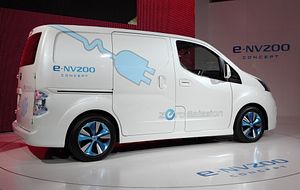Japanese automakers are beginning to unveil their new lines of fuel-efficient and eco-friendly cars this week. With strict emissions regulations at home, and a tightening market abroad (especially in China), these car manufacturers are seeking to stay ahead of the curve and secure a dominant position in this growing segment of the auto industry.
Earlier this week, Nissan unveiled the follow up to its 2010 LEAF, the first mass produced electric passenger vehicle. According to the Economic Times, the new e-NV200 will be a zero-emission commercial van, with a range of 190 km when fully charged. As a more utility oriented vehicle, the car can serve as an outboard source of power, by providing two 100V outlets or emergency lighting to an outside unit. Nissan has said that the e-NV200 will go on sale in select countries in in Europe before its October release in Japan, will come in either a five or seven seat model, and cost around $37,900. The price in Japan will likely be lower however, due to government subsidies for eco-friendly car purchases.
The car can be fully charged in eight hours, or with its quick-charge system it can reach 80 percent in around 30 minutes. So far Nissan is only projecting to sell 200 of these new cars per month in Japan, which probably due to poor sales of the LEAF so far worldwide. These low sales are usually attributed to the high price of the car, the relatively short distance the car can drive on a single charge, and a lack of charging stations.
Meanwhile, Mazda on Wednesday said it will release its new Mazda2 (or Demio in Japan) model soon, which will meet Japan’s strict Post New Long-term Emissions Regulations. The car will feature Mazda’s SKYACTIV-D 1.5 technology, which is part of the company’s diesel engine models designed to meet low-emission regulations. The carmaker stated that this new technology will ensure the car “achieves among the highest level test mode fuel economy figures for a vehicle powered solely by combustion engine in Japan, excluding hybrid and 660cc minivehicles.”
While the new Mazda technology will be installed in an already popular model, Nissan’s e-NV200 will face a more difficult future as both electric vehicles and the infrastructure necessary to make them feasible are still being developed. Japanese subsidies will improve the situation somewhat, especially in ultra-urban areas like Tokyo where distances traveled are likely to be shorter, and charging stations are more likely.

































